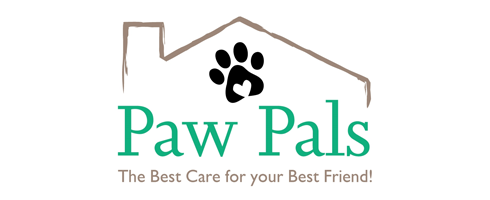Each year, as flu season rolls around, we focus on keeping ourselves healthy, but did you know your dog could catch the flu, too? That’s right: dogs are susceptible to their own version of the influenza virus, most commonly referred to as “canine flu” or “dog flu.”
As a dog owner in Northern Virginia, it’s important to stay informed on the risks, symptoms, and preventive steps for canine influenza. Whether your pup loves playdates and dog parks, or is occasionally boarded, understanding how to protect their health during flu season is essential, and at Paw Pals Pet Sitting, our pet sitters are ready to support your pet’s wellness every step of the way.
What Is Canine Flu?
Canine influenza is a contagious respiratory illness caused by influenza A viruses that affect dogs. The two main strains currently circulating in the U.S. are H3N8 and H3N2. According to the American Veterinary Medical Association (AVMA), both strains can cause illness in dogs of all breeds and ages. These are not isolated cases, as infections have been reported in nearly every state, including Virginia.
While not typically life-threatening, dog flu can become serious, especially in very young, elderly, or immunocompromised pets.
Symptoms of Dog Flu
Just as influenza symptoms vary from mild to severe in humans, the same is true for dogs. In fact, up to 20–25% of dogs infected with canine flu may show no signs at all, while still spreading the virus.
Watch for the following symptoms:
- Persistent coughing
- Sneezing
- Runny nose or nasal discharge
- Fatigue or unusual lethargy
- Loss of appetite
- Fever (can rise between 103–106°F)
- Difficulty breathing (in more severe cases)
If your dog exhibits any of the above, especially if they’ve recently been around other animals, it’s best to contact your veterinarian.
Complications & High-Risk Dogs

Most healthy dogs recover from the flu with proper rest and supportive care. However, complications like pneumonia can occur, making prompt diagnosis and treatment imperative.
High-risk categories include:
- Puppies and senior dogs
- Dogs with pre-existing respiratory issues or compromised immune systems
- Brachycephalic (flat-faced) breeds such as Bulldogs, Boxers, Pugs, and Shih Tzus, who are more prone to breathing issues even without illness
If your dog falls into any of these groups, be extra cautious during high-transmission seasons (late fall through early spring).
Is Canine Flu Contagious?
Yes, very! Canine flu is highly contagious among dogs and spreads much like human flu:
- Through coughing, barking, or sneezing
- From shared surfaces like food bowls, water dishes, toys, leashes, or bedding
- Via contact with contaminated clothing or human hands
A major concern is that dogs can be contagious even when asymptomatic. The virus can survive up to 48 hours on surfaces, 24 hours on clothing, and 12 hours on a person’s hands. Maintaining good hygiene and monitoring your dog’s social interactions is key.
How Is Canine Flu Treated?
There’s no specific antiviral cure for canine flu, but treatment focuses on supportive care, just like with humans:
- Ensure your dog gets plenty of rest
- Provide clean, fresh water at all times
- Isolate your pet from other dogs during recovery
- Administer any medications prescribed by your vet (such as antibiotics for secondary bacterial infections)
Most dogs recover within 2–3 weeks. Never give your dog medication intended for humans, this can be dangerous or even fatal, as their immune systems are completely different from our own.
When to See the Vet
If your dog is coughing, seems unusually tired, or refuses their food, don’t delay. Flu symptoms can look similar to more serious conditions like kennel cough, distemper, or pneumonia. Early diagnosis gives your pet the best chance for a full recovery.
Your veterinarian may recommend a chest x-ray, blood tests, and symptomatic treatment. In more severe cases, hospitalization and IV fluids may be necessary.
Is There a Vaccine for Dog Flu?
Yes, a canine influenza vaccine is available and recommended by many veterinary professionals, especially for dogs that:
- Visit dog parks
- Attend daycare, boarding, or grooming facilities
- Live with other pets
- Participate in training classes or group activities
The vaccine won’t always prevent infection, but it can reduce the severity and duration of symptoms. Ask your vet whether your pet should be vaccinated based on their lifestyle, age, and health history.
How Paw Pals Helps Pets Stay Healthy in Northern Virginia
At Paw Pals Pet Sitting, we understand how important it is to keep your pets safe, especially during flu season. If your dog becomes ill or needs rest and minimal stress while you’re away at work or traveling, our pet care services are designed to help.
We offer:
- Daily Dog Walking: Give your pup the exercise they need and can tolerate, even if they’re feeling a bit under the weather.
- Pet Sitting: Drop-in visits and hourly care to ensure comfort and monitoring throughout the day.
- Overnight Pet Sitting: Keep a close eye on your dog’s condition in the comfort of their own home, especially helpful when recovering from illness.
- Medication Administration: Our trained pet sitters can administer vet-prescribed meds for pets with special needs.
Our reliable, compassionate team serves families in Fairfax, Centreville, Herndon, Reston, and neighboring Northern Virginia communities. We’re also trained in basic pet first aid and wellness monitoring, so you can rest assured your pet is in capable hands.
Need Support for Your Dog During Flu Season?
If your dog is showing signs of illness or recovering from canine flu, leave it to the pros at Paw Pals. We’ll give your pet the gentle exercise, close attention, and loving care they need; even when you can’t be there.
Contact us today to learn more about our dog walking and pet sitting services in Northern Virginia, and let us help keep your pup happy and healthy all year long.
"*" indicates required fields
Updated on 10/29/2025


